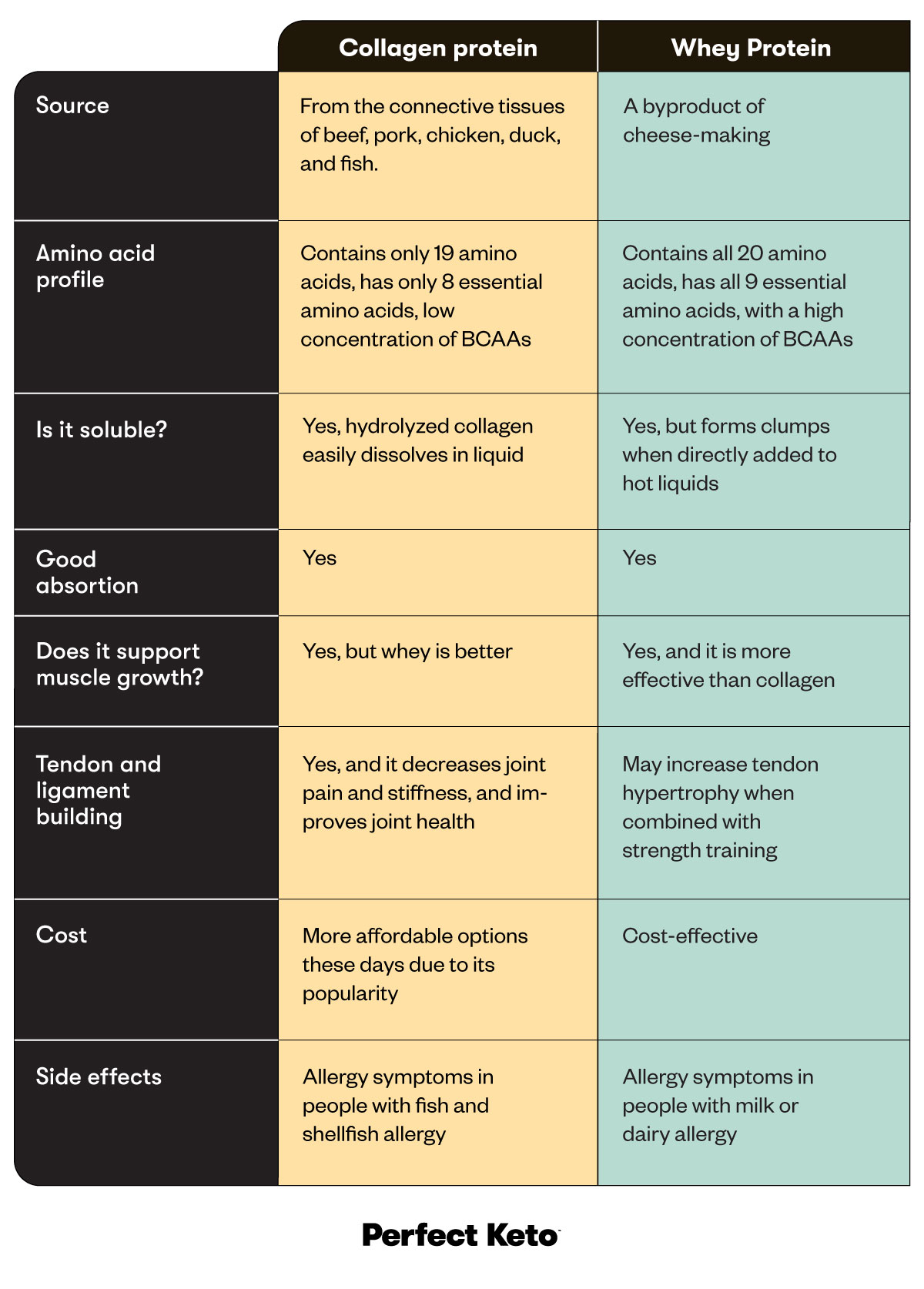Collagen Peptides Vs Collagen Protein is broken-down collagen that is easily digested, while collagen protein is intact collagen for supplementation. When deciding between collagen peptides and collagen protein for ingestion, it is essential to consider the differences in their digestion and absorption by the body.
Collagen Peptides vs. collagen Proteins are hydrolyzed collagen broken down into small peptides, making them more accessible for the body to absorb and utilize. On the other hand, collagen protein is intact collagen that may be more difficult for the body to digest. Understanding these distinctions can help individuals make informed choices about which form of collagen is best suited to their needs and preferences.
Additionally, considering factors such as purity, bioavailability, and potential benefits can further guide decision-making in selecting the most suitable collagen supplement.
Differences In Form
Understanding the differences in form is crucial when deciding between collagen peptides and collagen proteins. Both types offer distinct features and benefits, which are essential to consider. Let’s delve into the specifics of collagen protein and collagen peptides to shed light on their unique characteristics.
Collagen Protein
Collagen Peptides Vs. Collagen Protein, also known as whole collagen, is a complete protein found in the connective tissues, bones, skin, and tendons of animals. It comprises long chains of amino acids, forming a complex structure that is difficult for the body to digest or absorb efficiently.
Collagen Peptides
Conversely, collagen peptides, also known as hydrolyzed collagen, undergo a process called hydrolysis. This process breaks down the long chains of collagen protein into smaller, easily digestible peptides. As a result, collagen peptides are more accessible and readily absorbable by the body.

Credit: perfectketo.com
Biological Availability
Biological availability refers to the extent and rate at which a substance, such as collagen, can be absorbed and utilized by the body for various functions. Understanding the absorption mechanisms of collagen peptides and collagen protein is essential in determining their effectiveness.
Absorption Of Collagen Protein
Collagen protein, in its whole form, consists of large protein molecules that are difficult for the body to break down and absorb efficiently. Due to its complex structure, the absorption of collagen protein is relatively limited.
Absorption Of Collagen Peptides
Collagen Peptides vs. collagen Protein, on the other hand, are hydrolyzed collagen broken down into smaller peptide chains, making them more accessible for the body to digest and absorb. This process enhances the bioavailability of collagen peptides, allowing for better absorption and utilization within the body.
When choosing between collagen peptides and collagen protein, considering their biological availability is crucial for determining which form may be more effective in providing the desired benefits for overall health and wellness.
Health Benefits
Collagen peptides and collagen protein are different forms of collagen, with collagen peptides being considered the better option for ingestion. Collagen peptides are hydrolyzed, meaning they have been broken down into smaller peptides that are easier for the body to digest.
On the other hand, collagen protein is the body’s naturally produced form of collagen.
Benefits Of Collagen Protein
Collagen protein offers various health benefits:
- Improved Skin Health: Collagen protein helps to boost skin elasticity and hydration, reducing the appearance of wrinkles and promoting a youthful complexion.
- Joint Health: Collagen protein supports joint health by enhancing cartilage strength and reducing joint pain and stiffness.
- Increased Muscle Mass: Collagen protein can aid in muscle recovery and promote the growth of lean muscle mass.
- Stronger Bones: Collagen protein plays a crucial role in maintaining bone strength and preventing conditions like osteoporosis.
- Improved Gut Health: Collagen protein supports gastrointestinal health by reinforcing the protective lining of the digestive tract and reducing symptoms of leaky gut syndrome.
- Enhanced Hair and Nail Growth: Collagen protein helps to strengthen hair and nails, promoting healthy growth.
Benefits Of Collagen Peptides
Collagen peptides provide various health benefits:
- Skin Rejuvenation: Collagen peptides promote skin elasticity and reduce wrinkles, giving your skin a more youthful appearance.
- Improved Joint Flexibility: Collagen peptides support joint health by reducing inflammation and improving flexibility.
- Faster Muscle Recovery: Collagen peptides aid in muscle recovery by reducing muscle soreness and supporting tissue repair.
- Enhanced Digestive Health: Collagen peptides can help heal the gut lining, reduce digestive issues such as bloating, and improve overall gut health.
- Stronger Hair and Nails: Collagen peptides promote the growth of healthy, strong hair and nails.
- Healthy Aging: Collagen peptides contribute to healthy aging by promoting cellular repair and reducing the signs of aging.

Credit: levelsprotein.com
Suitability For Dietary Needs
When choosing between collagen peptides and collagen protein, it’s essential to consider their suitability for dietary needs. Each form of collagen serves a distinct purpose, and understanding their roles in various diets can help individuals make informed decisions about supplementation.
Collagen Protein In Diets
Collagen Peptides vs. collagen Protein, typically found in the form of gelatin or collagen hydrolysate, has gained popularity as a dietary supplement due to its potential benefits for joint and bone health. It’s a complete protein, rich in amino acids glycine, proline, and hydroxyproline, which support the body’s connective tissues and muscles. This makes collagen protein a suitable option for individuals looking to support their overall protein intake, especially those following a paleo or ketogenic diet.
Collagen Peptides In Diets
Conversely, collagen peptides, also known as hydrolyzed collagen, are broken down into smaller peptides, making them easily digestible and absorbable by the body. The bioavailability of collagen peptides makes them an ideal choice for individuals aiming to support skin elasticity, hair health, and nail strength. Additionally, they can be easily incorporated into various diets, including those focusing on weight management and beauty-enhancing regimens.
Comparison In Powder Form
Collagen peptides and collagen proteins are different forms of collagen. Collagen peptides are broken down into small peptides, making them more accessible for the body to digest. Collagen protein, on the other hand, is the complete protein and may be more challenging for the body to absorb.
Texture And Flavor Of Collagen Protein Powder
Due to its intact protein structure, collagen protein powder has a slightly thicker texture than collagen peptides. Its flavor is often milder and can easily be blended with various beverages and recipes.
Texture And Flavor Of Collagen Peptide Powder
Collagen peptide powder has a smoother texture as the collagen molecules are broken down into smaller peptides. This results in a more easily dissolvable powder with a lighter consistency. In terms of flavor, collagen peptide powder is typically neutral and versatile for mixing into different foods and drinks.
Effectiveness As a Protein Source
When it comes to choosing between collagen peptides and collagen protein as a protein source, effectiveness plays a crucial role. Both options have distinct properties that determine their suitability for providing protein to the body.
Collagen Protein As A Protein Source
Collagen protein, in its whole form, is considered a complete protein. It contains all the essential amino acids that the body needs, making it a valuable protein source. However, the body might find it challenging to digest whole collagen, leading to suboptimal protein absorption.
Collagen Peptides As A Protein Source
On the other hand, collagen peptides are produced by breaking down animal collagen through hydrolysis, resulting in smaller peptide fragments. This form of collagen is easier for the body to digest, allowing for better protein absorption and utilization. Although collagen peptides are not a complete protein, they offer specific amino acids that contribute to various health benefits.

Credit: naturalforce.com
Frequently Asked Questions
Which Is Better, Collagen Peptides Vs Collagen Protein?
Collagen peptides are usually the best form for ingestion as they are broken down into small peptides, making them easier to digest.
Which Form Of Collagen Is Most Effective?
Collagen peptides are considered the best form, as they are broken down into small peptides for easy digestion. Considering collagen supplements, the side effects are usually mild digestive symptoms or taste issues, depending on your health. Collagen peptides are different from typical proteins in their amino acid content.
Is There A Downside To Taking Collagen Peptides?
The side effects of collagen peptides are usually mild, like digestive symptoms or a bad taste. However, this can vary depending on your overall health.
Do Collagen Peptides Work As Protein?
Collagen peptides are not considered complete proteins like animal—or plant-based protein powders. They have different amino acid content. Collagen peptides are fragments of collagen that have been broken down, making them more accessible for the body to digest.
Conclusion
Collagen peptides are often preferred for their digestibility and effectiveness as supplements. While collagen protein is a complete protein, collagen peptides are easier for the body to utilize. Understanding the difference can help you choose the best option for your individual needs.
Choose wisely for optimal results!



